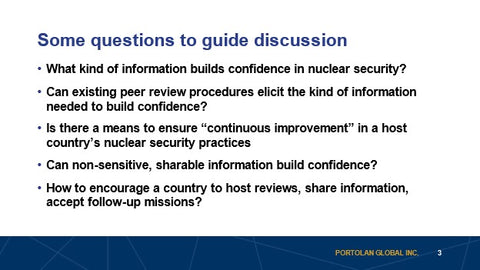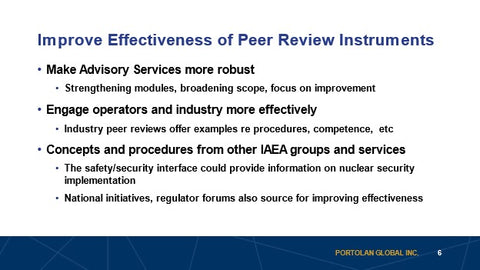Nuclear Security: Peer Reviews and International Assurances

[Official banner of the Amended Convention on the Physical Protection of Nuclear Materials (A/CPPNM) - reproduced courtesy of the IAEA]
In two weeks’ time, UN member states will gather in Vienna to review the only international legal instrument dealing with the security and protection of civil nuclear power plants and radiological devices. It’s called the Amended Convention on the Physical Protection of Nuclear Materials – or A/CPPNM/A. (28 March–1 April 2022)
It couldn’t come at a better – or a worse – time, depending on how you see the importance and relevance of this convention, whose objective is to commit states to ensure their civil nuclear materials and operations are defended against sabotage, criminal malfeasance, or terrorist attack.
It is the worst time – because such criminal attack is taking place right now by Russian military forces in Ukraine. And the fact that Russia is a party to the A/CPPNM, as is Ukraine, shows the weakness of this instrument in preventing its targeting of nuclear sites and threatening deliberate release of radioactive materials on the Ukrainian population.
It is the best time – because it’s a near-term opportunity for the international community to express collectively its outrage at Russia’s deliberate assault on Ukraine’s nuclear power installations and its blatant disregard for legally binding obligations prohibiting such behaviour.
Beyond expressing outrage at an indifferent Russia, what else can the Review Conference do to shore up the security of nuclear installations and operations in countries that use nuclear technology for power and for medical treatments?
I’m afraid there’s not much if you are expecting the A/CPPNM Review Conference to put an end to Russia’s war in Ukraine or its threats to destroy Ukraine’s nuclear reactors. Treaties can’t stop a state’s determination to break taboos and legal commitments. It’s up to other states to do that.
However, security-related conventions, treaties and commitments do a couple of things which the world cannot simply let drop or consign to irrelevance. Whether they be arms control agreements, politically binding documents, international rules and regulations to govern states’ conduct with respect to weapons technologies or curbs on large-scale military manoeuvres – these combine to produce expected behaviours that, if complied with by states, increase security collectively as well as nationally.
In short – they build confidence that threats to national and international security are managed and mitigated.
In times of stress – such as today – it is vital to keep intact the building blocks of such confidence, especially when someone is taking a hammer to the house. It is in our national and collective interest to retrench and rebuild the strength, resilience and effectiveness of our international security instruments.
Among such building blocks is the ensemble of norms, obligations and actions to protect the security of nuclear installations, as codified in the A/CPPNM. We therefore must use the Review Conference to strengthen the convention’s implementation and effectiveness. Put another way: are there mechanisms we can use to help assure each state party to the convention that others are complying with its provisions?
This brings us to peer reviews and international assurances.
A peer review mechanism uses impartial, technically expert teams to visit, review, provide feedback and report on a country’s A/CPPNM implementation. (The IAEA offers peer reviews in the form of International Physical Protection Advisory Services (IPPAS).) Such visits are designed as non-confrontational: they are not judgmental or accusatory. Rather, in a collaborative spirit, they help identify gaps or areas for improvement in a country’s procedures, policies, laws, regulations governing nuclear security.
By helping a country enhance its nuclear security capabilities, the peer review mechanism contributes to assuring others that the A/CPPNM is being effectively implemented. This, in turn, builds confidence and security. A virtuous circle.
We should therefore focus at the Review Conference on enhancing the peer review mechanism and providing capacity-building assistance for those countries needing a hand in improving their nuclear security capabilities. The involvement and support of industry in particular would be welcome, given its role in the implementation of security for power sites as well as for the distribution and use of radiological devices (e.g., medical, industrial).
Over the past years I have been involved in efforts to develop the industry-international governance nexus in strengthening nuclear security, safety, non-proliferation – as a member of the board of the World Institute for Nuclear Security (WINS) in Vienna and as a participant in the US-based Nuclear Threat Initiative’s “Global Dialogue on Nuclear Security”. Where possible, I seek to utilize my experience as the former Canadian Ambassador to the International Atomic Energy Agency (and chair of its Board of Governors) and as the former President & CEO of the industry-based Canadian Nuclear Association.
Today, it is the industry-international governance nexus that has a particular importance in building nuclear security compliance and confidence-building. [See my previous blogs: The IAEA’s Newly Created “Group of Vienna” and International Diplomacy & the Nuclear Industry: A Missing Piece of the Puzzle.] It is here that the concept of peer reviews finds its best place for further development. And it is here that we can help raise the standard for “effective CPPNM/A implementation” and thereby create greater security for all.
For an NTI Global Dialogue meeting held in the run-up to the A/CPPNM Review Conference, I was asked to prepare and present a paper on “Peer Reviews and International Assurances”.
The paper is posted here.
I hope you have time for a read of the paper. If you don't have time, here are the slides I used in presenting the key points. 








